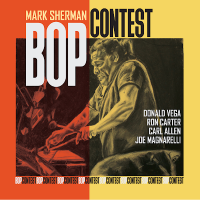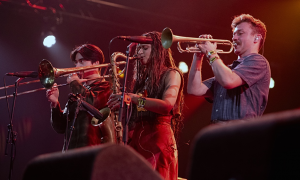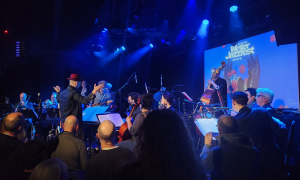Home » Jazz Articles » Live Review » King Crimson at Budweiser Stage & Théâtre St-Denis
King Crimson at Budweiser Stage & Théâtre St-Denis
Mastelotto continued to be as unpredictable as ever, dropping in a sample from an interview at one point during the second set, to the clear amusement of all on stage. He also delivered some of his most virtuosic playing ever, whether it was during the second set's penultimate "Starless" or his even fiercer work during the brief instrumental, "Radical Action II," which segued into a positively nuclear. first set-closing "Level Five."
Stacey may, with Rieflin's absence, have to play far more keyboards this time around than in 2017, but his contributions have become even more fundamental to songs like "Cat Food," "Islands" and the influential title track to Red, where his saw-toothed, cross-rhythmic textures were particularly significant. But as a drummer, he also proved himself an essential part of the front line, whether it was during the solo drum section set-openers "The Hell Hounds of Krim" and newer "Drumzilla," his contributions to the trade-offs at the start of "Indiscipline" or his polyrhythmic work to a particularly potent look at the gamelan-and minimalist-driven title track to Discipline (Editions E.G., 1981).
Beyond his remarkable and definitive drum arrangements, Harrison's inestimable contributions to Crimson ranged from the collective and collaborative three-kit parts that found him playing with everything from fiery, high-speed rhythms, which would seem impossible were they not there for the eye to see, to a particularly remarkable display of technical virtuosity coupled with compositionally focused spontaneity during what was most certainly his best "21st Century Schizoid Man" solo heard across the eight shows covered since 2014.
Collins didn't get as much overt solo space as in previous tours, largely due to the absence of features like Islands' "The Letters" and "The Sailor's Tale." Still, between his bottom heavy baritone support on songs like "Larks' Tongues in Aspic—Part IV," his searing soprano work during the 13/8 double time solo section of "Starless" that preceded Fripp's scorchingly overdriven, rapidly strummed chordal solo, or his alto feature during "21st Century Schizoid Man," including the now-regular quote from Duke Ellington's "Take the 'A' Train," coming before Harrison's impressive drum solo, Collins had more than enough space to shine amidst a group where nobody shines and yet everybody shines.
Levin remains a marvel. His ability to retain the core of any song's structure as he effortlessly moves between composed parts and more interpretively free revisions of those same structures is just one reason why, while Crimson has been blessed with many good-to-great bassists over the decades, none has proven as absolutely perfect and capable in any context as Levin. With the number of instruments onstage allowing Levin greater freedom than in any prior lineup, he remains a powerful groove-master, capable of swinging with authenticity and rocking hard with four-to-the-bar lines, while executing incredible reinventions during challenging, irregularly metered passages. But he has never before been afforded such freedom and the result is that Levin constantly straddled the fine line between time/groove keeper and contributor to some utter group anarchy that still, magically, managed to always find its way back to form on cue.
The initial response to Jakszyk, as a singer, was often unfairly harsh. Like the rest of the band, the first couple of years may have been about finding his place in the band, both vocally and instrumentally. But even then he was the only choice for a singer who could manage the entire breadth of the band's career. Now, six years on, not only is this impression even truer; it's now difficult to imagine anyone singing these songs but Jakszyk, and that's saying something, considering the number of fine vocalists who've been with the band across five decades. But since some watershed performances in 2017, some documented on the Meltdown audio/video box set, Jakszyk's strength as the band's lead vocalist has leapt to another level, as he now truly makes every song he sings his own. And as a guitarist, he's getting far more opportunities to demonstrate his masterful mettle than ever before, in particular during the "Easy Money" solo where, in Montréal, he began to double his guitar lines with his voice (and/or vice versa).
Which leaves Fripp. Much has already been written about how this is not just the first time in decades that he's been as well-lit as his band mates, how this is the first time in years where he engages in regular eye contact, both with members of the band and the audience, and how it's been a long, long time since he's looked this happy to be onstage, especially considering that he announced his then-permanent retirement from the road in 2012. With his September 14 and 17 performances (especially in Montréal), Fripp felt especially invigorated, capable of tremendous tenderness and beauty but also ferocious energy and outré angulatities.
With the current Crimson, Fripp (and the entire band, for that matter) seems to be provided an opportunity and freedom for the kind of stylistic and improvisational breadth and depth rarely, if ever, afforded in any other single performance or with any single group. From jazz proclivities to metallic tendencies, and the widest, most diverse ever demonstrations of texture and timbre, Fripp and the rest of his band mates certainly feel like they have never played better, increasingly, than with this three-drummer front line configuration of King Crimson.
Rumors abound about next year, as does the question of just how long this band can keep going, with both Fripp and Levin an apparently healthy 73, Collins a slightly younger (but still good-looking) 72, and the rest of their band mates ranging from their mid-50s to mid-60s. Despite its already large repertoire, however, there still remain a good number of King Crimson songs and, more aptly, compositions waiting for reinterpretation, reinvention and re-imagining by this extraordinary lineup.
Who knows if we'll ever get the chance to hear Islands' "Formantera Lady," the complete Lizard suite, In the Wake of Poseidon's "The Devil's Triangle" or In the Court of the Crimson King's "I Talk to the Wind"? While interpretations of Belew-sung pieces are relatively few and far between, there are compositions from the '80s lineup rife for re-imagining, like Discipline's "The Sheltering Sky," Beat's "Requiem" or Three of a Perfect Pair's "Larks' Tongues in Aspic (Part III)." From the mid-'90s Double Trio, it's not hard to imagine what this band might do with the two-part "Inner Garden," while The ConstruKction of Light's "FraKctured" and The Power to Believe's "Dangerous Curves" would be worthy additions to any set list. And, finally, from the 1973/74 Crimson, there's still "The Great Deceiver," Lament" and "The Nightwatch," amongst others.
But the truth is: before 2014, no committed fan ever thought they would get to see a King Crimson lineup perform music from across its entire career, with a wealth of new music to boot. And so, grateful is the best word that comes to mind for anyone fortunate enough to have seen King Crimson since its return to active duty in 2014, but especially since 2017, when things really seemed to gel and the band truly coalesced into the best King Crimson lineup ever.
Will we get to hear more? Only time will tell. But for those in Toronto and, in particular, Montréal during two evenings in September 2019 (and just under a month before the actual 50th anniversary of the release of In the Court of the Crimson King's release on October 10, 1969), if it were to be announced that the current lineup was calling it a day after its Celebration Tour? That would be more than plenty good enough.
Tags
Live Reviews
King Crimson
John Kelman
Canada
Montreal
Jeremy Stacey
Robert Fripp
Mel Collins
Tony Levin
Pat Mastelotto
Jakko M. Jakszyk
21st Century Schizoid Band
David Bowie
Van der Graaf Generator
pat metheny
duke ellington
About King Crimson
Instrument: Band / ensemble / orchestra
PREVIOUS / NEXT
Support All About Jazz
 All About Jazz has been a pillar of jazz since 1995, championing it as an art form and, more importantly, supporting the musicians who make it. Our enduring commitment has made "AAJ" one of the most culturally important websites of its kind, read by hundreds of thousands of fans, musicians and industry figures every month.
All About Jazz has been a pillar of jazz since 1995, championing it as an art form and, more importantly, supporting the musicians who make it. Our enduring commitment has made "AAJ" one of the most culturally important websites of its kind, read by hundreds of thousands of fans, musicians and industry figures every month.




























